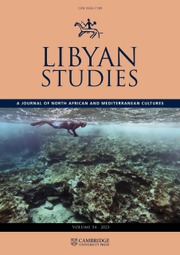Article contents
Lamluda: from the excavation to the archaeometric analysis
Published online by Cambridge University Press: 07 November 2014
Abstract
In the last ten years the Archaeological Mission of Chieti University in Cyrenaica has investigated, through intensive field surveys and excavations, several contexts of the Cyrenaican chora. Among the many recorded settlements, Lamluda is the most interesting because of its urban organisation, productivity and location at the intersection of the main road network. Our aim is to present the preliminary data from the mapping, survey and excavation of the site, including the results of the archaeometric analysis and the epigraphic study. Among the copious ceramic finds the Roman coarse wares and amphorae are particularly numerous, dating mainly to the Imperial, Late Roman and Byzantine periods. The pottery illustrates not only the longevity of the settlement, which lasted until the eighth or ninth century AD, but also helps to trace the evolution of agricultural wealth and trade. Through archaeometrical and archaeological research it is possible to identify the main local products and their circulation, as well as the imported or exported amphorae and hypothesise on the nature of their contents.
Information
- Type
- Articles
- Information
- Copyright
- Copyright © The Society for Libyan Studies 2014
References
References
Corpora inscriptionum
- 3
- Cited by

